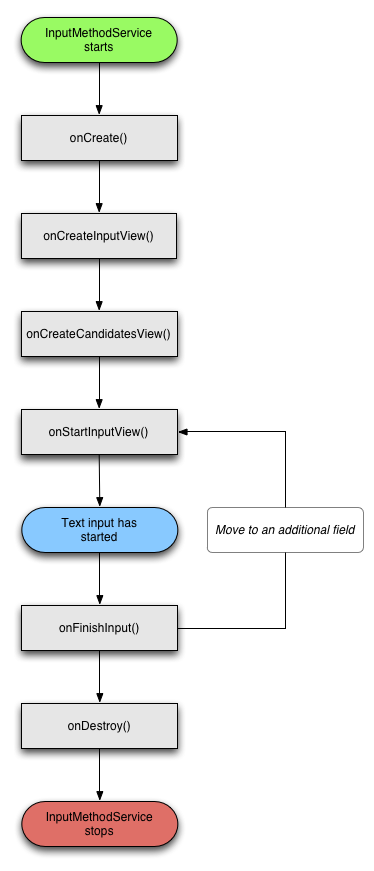2014년 3월 3일 월요일
[Android] TextEdit 원하는 언어의 IME 띄워주기.
TextEdit에서 원하는 IME를 출력시키려면?
인터넷을 찾아보면,
EditText lotId_input = (EditText) findViewById(R.id.lotStatus_lotId);
lotId_input.setPrivateImeOptions("defaultInputmode=english; ");
이런식으로 나오는데, 동작안됨.
>> IME가 지원을 하지 않기 때문.
## OpenSource 키보드를 확인해보자..
Kandroid에서 공유된 오픈소스 키보드다.
https://code.google.com/p/hangulkeyboard/source/checkout
여기를 확인해보면, onStartInput 함수에서 EditorInfo attribute 값을 주목하자.
>> 소스를 커스터마이즈 해서, 옵션이 들어가면 키보드를 변경하는 루틴을 추가하면
될 것이라 예상 된다.
SoftKeyboard.java
/**
* This is the main point where we do our initialization of the input method
* to begin operating on an application. At this point we have been
* bound to the client, and are now receiving all of the detailed information
* about the target of our edits.
*/
@Override public void onStartInput(EditorInfo attribute, boolean restarting) {
super.onStartInput(attribute, restarting);
/*
Log.i("Hangul", "onStartInput");
*/
clearHangul();
clearSejong();
previousCurPos = -1;
// Reset our state. We want to do this even if restarting, because
// the underlying state of the text editor could have changed in any way.
mComposing.setLength(0);
updateCandidates();
if (!restarting) {
// Clear shift states.
mMetaState = 0;
}
mPredictionOn = false;
mCompletionOn = false;
mCompletions = null;
// We are now going to initialize our state based on the type of
// text being edited.
switch (attribute.inputType&EditorInfo.TYPE_MASK_CLASS) {
case EditorInfo.TYPE_CLASS_NUMBER:
case EditorInfo.TYPE_CLASS_DATETIME:
// Numbers and dates default to the symbols keyboard, with
// no extra features.
mCurKeyboard = mSymbolsKeyboard;
break;
case EditorInfo.TYPE_CLASS_PHONE:
// Phones will also default to the symbols keyboard, though
// often you will want to have a dedicated phone keyboard.
mCurKeyboard = mSymbolsKeyboard;
break;
case EditorInfo.TYPE_CLASS_TEXT:
// This is general text editing. We will default to the
// normal alphabetic keyboard, and assume that we should
// be doing predictive text (showing candidates as the
// user types).
mCurKeyboard = mQwertyKeyboard;
mPredictionOn = true;
// We now look for a few special variations of text that will
// modify our behavior.
int variation = attribute.inputType & EditorInfo.TYPE_MASK_VARIATION;
if (variation == EditorInfo.TYPE_TEXT_VARIATION_PASSWORD ||
variation == EditorInfo.TYPE_TEXT_VARIATION_VISIBLE_PASSWORD) {
// Do not display predictions / what the user is typing
// when they are entering a password.
mPredictionOn = false;
}
if (variation == EditorInfo.TYPE_TEXT_VARIATION_EMAIL_ADDRESS
|| variation == EditorInfo.TYPE_TEXT_VARIATION_URI
|| variation == EditorInfo.TYPE_TEXT_VARIATION_FILTER) {
// Our predictions are not useful for e-mail addresses
// or URIs.
mPredictionOn = false;
}
if ((attribute.inputType&EditorInfo.TYPE_TEXT_FLAG_AUTO_COMPLETE) != 0) {
// If this is an auto-complete text view, then our predictions
// will not be shown and instead we will allow the editor
// to supply their own. We only show the editor's
// candidates when in fullscreen mode, otherwise relying
// own it displaying its own UI.
mPredictionOn = false;
mCompletionOn = isFullscreenMode();
}
// We also want to look at the current state of the editor
// to decide whether our alphabetic keyboard should start out
// shifted.
updateShiftKeyState(attribute);
break;
default:
// For all unknown input types, default to the alphabetic
// keyboard with no special features.
mCurKeyboard = mQwertyKeyboard;
updateShiftKeyState(attribute);
}
// Update the label on the enter key, depending on what the application
// says it will do.
mCurKeyboard.setImeOptions(getResources(), attribute.imeOptions);
}
참고:
http://effectiveprogramming.tistory.com/11
http://android-developers.blogspot.kr/2009/04/creating-input-method.html
# 본 게시물의 View수가 많은 것 같아서 해결책을 덧붙여본다.
InputMethodManager imm = (InputMethodManager)mContext.getSystemService(Context.INPUT_METHOD_SERVICE);
String inputId = "";
List<InputMethodInfo> inputMethodInfos = imm.getInputMethodList();
for ( InputMethodInfo inputMethodInfo : inputMethodInfos ) {
if ( inputMethodInfo.getId().contains(keyType)){
inputId = inputMethodInfo.getId();
break;
}
}
INPUT_METHOD_SERVICE를 이용해서, 시스템에 설치된 키보드의 ID를 가져온다.
imm.setInputMethod(null, inputId);
setInputMethod함수로 해당 아이디를 지정하면, 기본 IME가 변경된다.
피드 구독하기:
댓글 (Atom)

댓글 없음:
댓글 쓰기